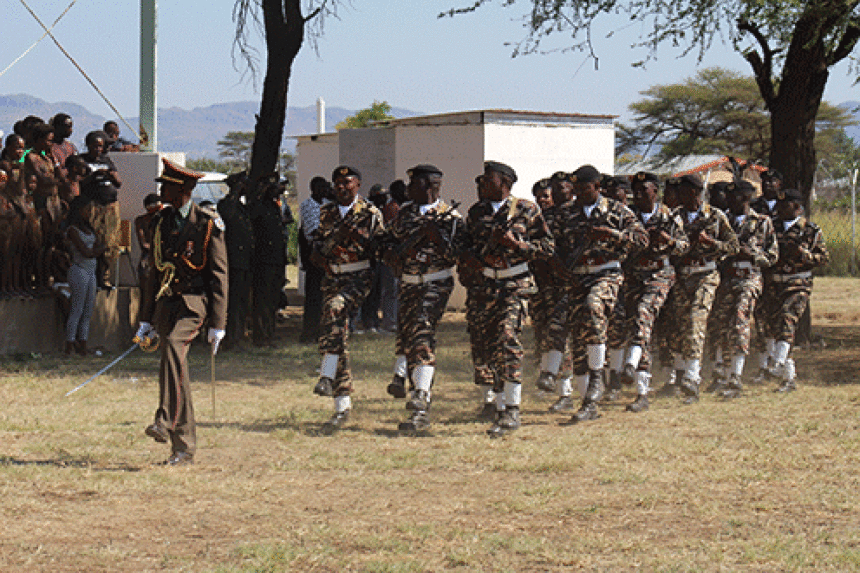Following public outcry among unemployed young people over the Namibian Defence Force’s mandatory health, academic, and age cap requirements for recruitment, the ministry hit back yesterday, saying the force should not be seen as a job creator.
NDF asked Namibians between the ages of 18 and 25 (before 31 July 2022) who passed grade 12 with 25 points to apply as cadets.
Applicants must be ready to undergo medical tests, which includes an HIV/Aids test, must have a grade 12 certificate, and should be able to run 2.4 km in 14 minutes and 30 seconds (women). They should also provide a vaccination
card. With youth unemployment estimated at 50% by the United Nations, thousands of young people readied themselves to apply.
They flocked to various hospitals to get Covid-19 vaccines as it is one of the recruitment requirements set by the ministry of defence to appoint 1 500 cadets for the force, which kicked off this week countrywide.
Namibia’s national Covid-19 vaccination campaign received a welcome boost from previously vaccine skeptic youth as a vaccination card is a condition for recruitment by NDF.
By 10 July, only 476 907 people had their first dose of the vaccine, leaving Namibia falling far short of vaccination milestones set by the World Health Organistaion (WHO) to curb the spread of the pandemic.
The vaccine card requirement, however, did not go down well with many resorting to social media to vent their frustration.
Some asked why NDF would make it mandatory for applicants to produce Covid-19 vaccination cards if the labour law of the country does not state it as a must for one to be vaccinated.
Equally, some argue that the majority of soldiers serving the force currently are not vaccinated, hence they feel the recruitment process is not fair.
Popular Democratic Movement’s member of parliament, Elma Dienda added her voice to those questioning the HIV negative requirement when she asked the minister of defence, Frans Kapofi to explain the “discriminatory requirements for recruitment of military cadets into the NDF”.
She said, “the same requirements that subject young people to mandatory Covid-19 vaccination and HIV/Aids test, should also apply to members of parliament.”
In response, the ministry’s deputy executive director for strategic planning Petrus Nathinge cleared that it must be understood that the ministry of defence is not an employment creation institution, but it is the most effective insurance at the disposal of the country.
“It must therefore be managed by and employ selfless and brave sons and daughters who are ready to pay the ultimate sacrifice for their motherland,” he reacted.
The applicants who wish to join the NDF are required to submit copies of both sides of their vaccination cards, attached to the government job application forms, before submitting them to their constituency councillor’s offices.
In this regard, Nathinge clarified that Covid-19 vaccination is one of the mitigating, if not preventive measures, against the spread of the pandemic.
According to him, during military and fitness training activities, it is not advisable for one to wear a mask as that may lead to oxygen deprivation resulting in suffocation.
Further, he argued military training is physically demanding and involves contact among the trainee.
Nathinge also reasoned that Covid-19 test is a mandatory requirement when it comes to military bilateral and multilateral engagements.
“Nowadays, a negative Covid-19 test and proof of vaccination are a prerequisite. It is thus on the basis of these limitations that proof of Covid-19 vaccination is a requirement. The ministry of defence is not forcing anybody to be vaccinated, but expects all the applicants to be those who meet the set requirements,” Nathinge explained.
Other requirements include a comprehensive medical check-up and applicants will undergo a physical fitness test.
On HIV testing, he maintained training is an arduous undertaking that involves physically straining activities and which at times cause injuries to individuals.
“Equally, he said the NDF as an instrument of foreign policy is expected to participate in bilateral and multilateral activities where a negative HIV test is in most cases a requirement.
“The HIV test is just a precautionary measure to prevent further transmission in training and elsewhere NDF soldiers will be expected to participate or operate under strenuous conditions,” he noted.
Physical fitness includes running 2.4km in 13 minutes for male candidates.
Male cadets should also do 43 sit-ups, whereas women will do 25 sit-ups or more to pass the physical fitness test.
Women are expected to do 28 push-ups or more, while men must do 30 or more.
Here, Nathinge explains subjecting applicants to a basic fitness test that includes a 2.4km run and others is a universal practice.
Sadly, he reported the NDF recorded incidences in the past of persons who got physically injured during basic fitness training as they couldn’t even run 100m at whatever speed.
“Such people suffered in training and some even ended up opting out. To prevent a repeat of such scenarios, it was then decided that a basic fitness test must be included in the initial selection process.
Nathinge said it should be understood that globally, defence forces recruit highly qualified members for a number of reasons.
He mentioned members will operate sophisticated war-fighting machines that cannot be operated by school dropouts, such as flying fighter aircraft, navigating warships, artillery, and missile systems for the motherland and national interests.
He clarified that since 1996, the ministry has gradually recruited young Namibian volunteers ages 18-25 years with prescribed education and other qualifications.
He said recruitment for the defence force is a continuous process as it aims at filling the vacancies created annually through retirements, resignations, discharges, and deaths.
–anakale@nepc.com.na



